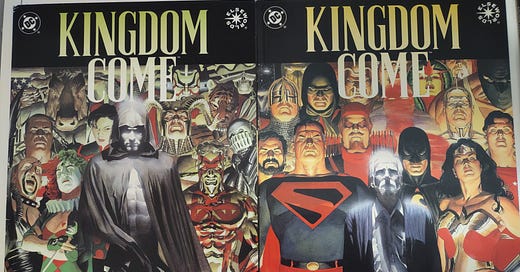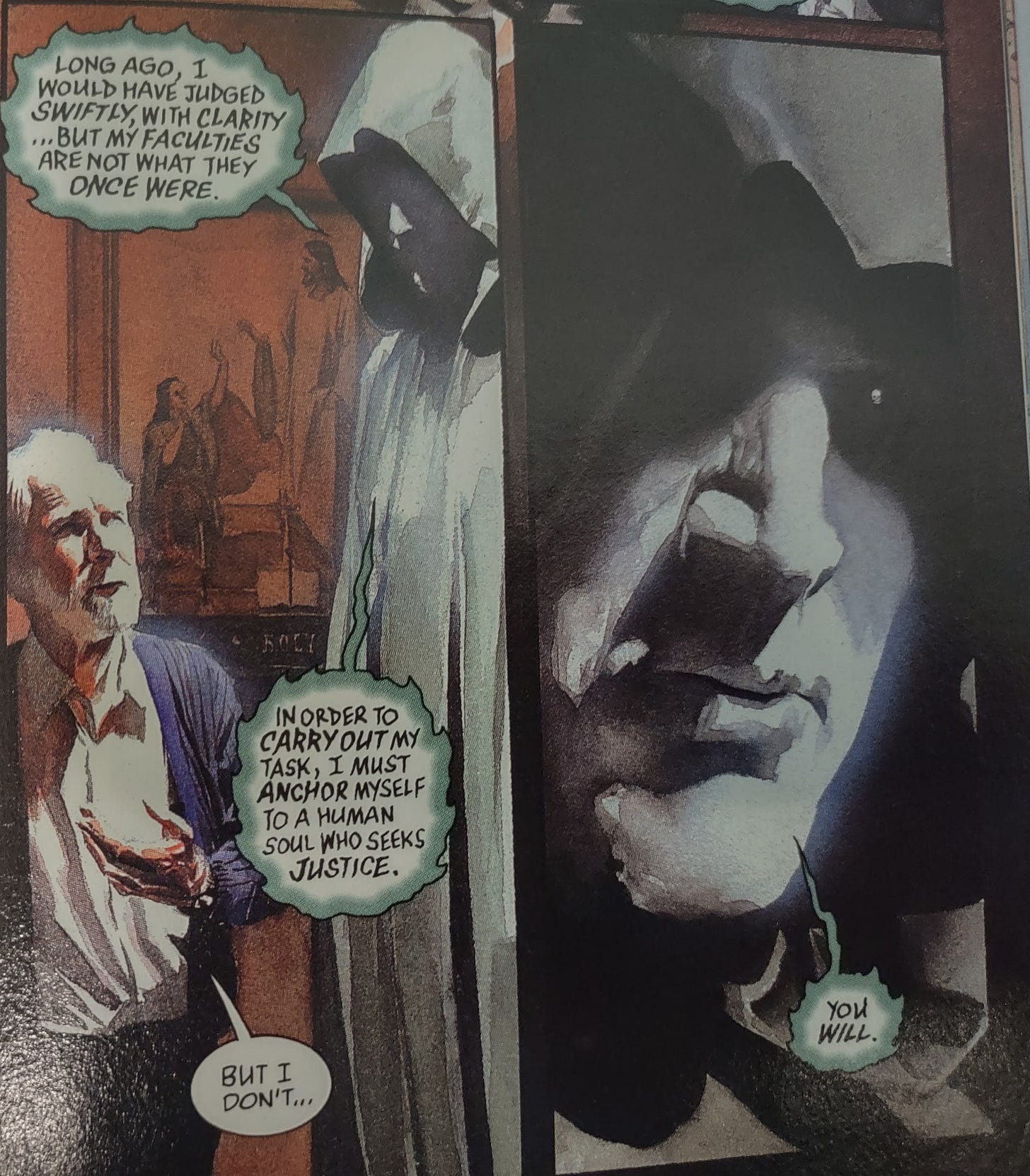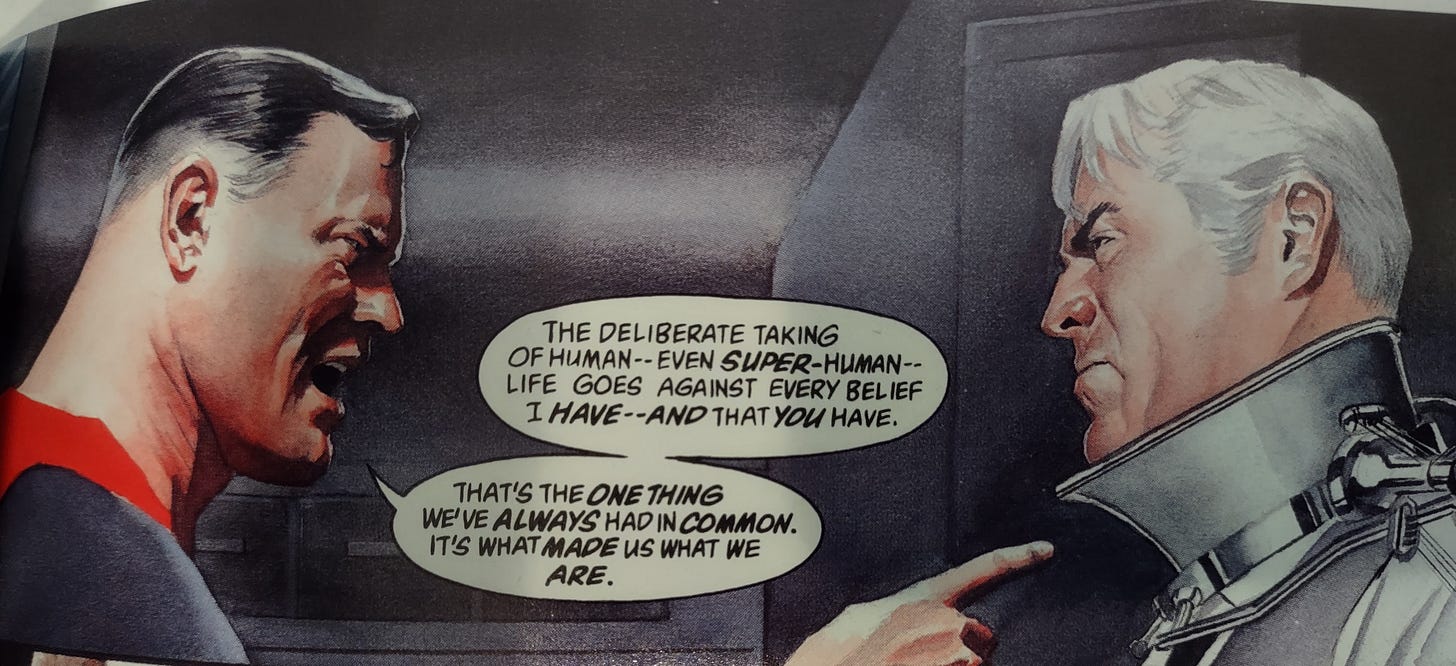‘Kingdom Come’ Explores What It Means to Be a Superhero
Not coincidentally, it also ranks among the best Superman stories.
A few years back, I reread Kingdom Come for the first time in ages to see how well the 1996 miniseries holds up.
Exceptionally well, it turned out. Mark Waid wrote it and Alex Ross painted it, so that was a pretty safe bet. (I recently wrote about Ross’s Fantastic Four graphic novel here.) I’m dusting off my previously written issue-by-issue reactions because this wonderful comic deserves the attention.
#1
Kingdom Come takes place in the DC Universe’s possible future, in which the younger generation runs amok without understanding the true meaning of heroism (super or otherwise). The Justice League’s generation is all either retired or focused solely on their respective home turfs. And we view it all through the eyes of an ordinary preacher, whom the Spectre recruits as his human anchor.
This is, first and foremost, a Superman story, and one of the great Superman stories. In this world, Superman has been gone for ten years, leaving a tremendous void. We see the importance of his ideals in their absence. This has felt especially relevant in recent years, since Superman has been largely missing from his own movies.
Like the Man of Steel movie version, this Superman isn’t exactly a happy, smiling sort of fellow. But there are reasons why. He’s a Superman who’s lost his way and needs to get himself—and the world—back on track. As contradictory as it sounds, the Kingdom Come Superman is out of character in a way that demonstrates a superb understanding of his character. In this first issue, how he got there and how he’ll recover aren’t fully apparent.
Ross’s art deserves ample praise, of course. He demonstrates a phenomenal level of detail, putting so much care into countless character designs and set designs. Look at all the Easter eggs in the Planet Krypton diner, or the tiny skull in the Spectre’s eye, or how Superman’s presence instantly evokes a sense of grandeur.
#2
This is the “gathering of forces” issue. Superman rebuilds the Justice League. Batman and a few other non-powered ex-Leaguers make their own appeal to the younger generation. Lex Luthor and a cabal of old villains are up to something. And the antiheroes continue to do whatever they damn well please … but with significantly tougher opposition now.
The issue succeeds by focusing on differing worldviews. Superman and Batman’s argument, which involves not a single punch or blast of heat vision, is far more compelling than anything seen in the Batman v. Superman movie. Wonder Woman, who’s serving as Superman’s right hand, also sees things differently than the Man of Steel due to her experience as a warrior.
Then there’s Magog, the “superhero” who precipitated Superman’s retirement. Magog took it upon himself to kill the Joker rather than apprehend him. Superman wouldn’t stand for such a blatant disregard for the law and human decency, so he took Magog to court. However, Metropolis and its citizens sided overwhelmingly with Magog. He was the future, and Superman was the past.
But new doesn’t always equal right, and as we saw in #1, Magog’s carelessness resulted in the deaths of a million innocents. And his genuine remorse in this issue adds just enough depth to his character.
“They chose the man who would kill over the man who wouldn’t,” Magog says, “and now they’re dead.”
#3
Superman doesn’t want to adjust to a changing world, but Captain Marvel couldn’t adjust. Superman strives to maintain peace, but Wonder Woman is prepared for war, if necessary.
The inclusion of Captain Marvel (the superhero known only as Shazam these days) is an excellent choice. He truly is DC’s most innocent superhero. He’s a child who can transform into a super-powered adult, but he’s still a child at heart. But this miniseries is set in the future, and Billy Batson is all grown up … and the manner in which he’s grown up reflects the world around him. He simply doesn’t fit in with this darker age, leading him into Lex Luthor’s thrall. His cheesy smile has never been creepier.
The series handles the conflict between Superman’s idealism and Wonder Woman’s pragmatism especially well, and it’s all the more interesting because it’s a conflict between two people who respect each other a great deal.
Tensions escalate throughout the issue. We get some relief as Batman has his grand moment to shine. But this is all about putting the pieces into place for the climactic battle, and it features many excellent moments along the way, including this fantastic quote from Superman to Batman:
“The deliberate taking of human—even super-human—life goes against every belief I have—and that you have. That’s the one thing we’ve always had in common. It’s what made us what we are.”
#4
Kingdom Come arrives at a superb conclusion.
The Superman in this miniseries has been one who’s lost his way. He still wants to do the right thing, but his previously impeccable judgment is impaired. This issue addresses how he let that happen and how to change the course of that mighty error … but only after he reaches his breaking point, brought upon in part by his own incredible sense of responsibility.
Wonder Woman, too, has strayed, and her arc comes to a head in an excellent confrontation with Batman. And Captain Marvel is extremely well cast as the one character who is both superhuman and human.
The two-page spread early in the book showcases Alex Ross’s amazing artistic talents. He crams so many characters on the battlefield, with every bit player and background actor engaged in a specific action against a specific opponent. Throughout the book, each page is a phenomenal work of painted art.
Writer Mark Waid clearly understands superheroes’ two most important roles—to fight always for life and to inspire. Unless they do these two things, they’re not truly superheroes.
This series is ultimately all about superheroes becoming heroic again, and it’s one of the greatest Superman stories ever told. I’d have a tough time ranking my all-time favorite comics (the best I can do is break them up into five-year increments by publisher), but Kingdom Come would be a strong candidate for the top ten. Possibly top five.








Liked Marvels a lot more than Kingdom Come but both were great stories and impressive showcases for Ross's work
The first painted comics we ever saw from Alex Ross were both thoughtful stories about the need for heroes to inspire us. "Marvels," written by Kurt Busiek, explored this theme from a nostalgic perspective looking back to the past. "Kingdom Come," written by Mark Waid, shows instead a possible future, a time where people with great powers have largely forgotten that they must also exercise great responsibility. Both are stories well worth reading...